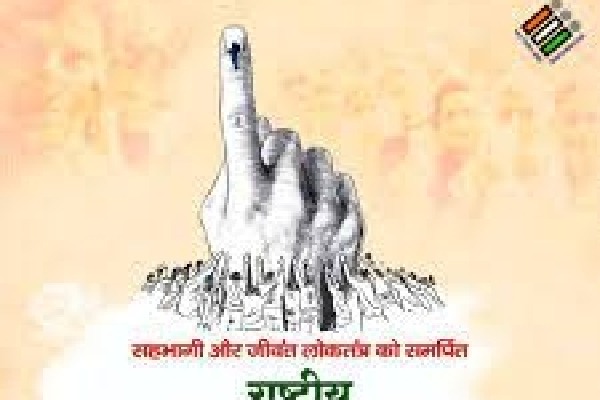National Voters Day: 17.32 crore voters in 1951 to around 95 crore in 2024

New Delhi, Jan 25: The date chosen for National Voters' Day commemorates the formation of the Election Commission of India (ECI) on January 25, 1950.
The first general elections of independent India were held on October 25, 1951-52. The part results of the first general elections of India were announced on February 10, 1952, about 72 years ago. It was a mission to successfully conduct first general election in a country with such a vast topography, diverse cultures and varying climatic conditions.
The first elections had 196,084 polling booths and 27,527 booths were reserved for only women. The first vote was cast in the Tehsil of Chini in Himachal Pradesh.
About 1,874 candidates of 53 parties contested elections for 489 seats. The Congress won the elections with 364 seats as the people voted for the party led by Jawaharlal Nehru.
CPI finished second with 16 seats as they got about 3.29 per cent votes. Approximately 45 per cent of the total votes were polled for the Congress in the first Lok Sabha elections.
As India's first democratic giant leap, in the first general elections in India - the Congress had won the elections with 364 seats out of 489 seats.
During the first elections, the population of India was 36 crore, out of which, 17.32 crore population was eligible to vote.
Today, India's population is as high as 144 crore, with 66 per cent of India's population, nearly 80.8 crore, below the age of 35 years.
In the 2019 Lok Sabha elections, there were 15 million first-time voters and the numbers are expected to rise this year as the Indian population's median age stays less than 30. In 2024, the country has around 95 crore voters.
This makes India a country that has the privilege of housing world's largest youth population and also young voters population. You call them the "change makers" or "growth engine of economy", the truth is that this AI-driven generation would set the tone for the growth of Indian economy for the next 25 years.
"My one vote will make the difference in Indian democracy you see, as there are many like me who are discussing which party to vote in General Elections 2024," said a college student, a first-time voter.
Under Rajiv Gandhi government, when the Parliament had passed the Constitution (Sixty-first Amendment) Act, 1988 in Lok Sabha which lowered the voting age for elections to Lok Sabha from 21 years to 18 years by amending Article 326 of the Indian Constitution, who knew that one day such a decisive population of Indian youth would be driving India to deliver best in the world.
These young and vibrant voters are already assessing their priorities and India's vision to be amongst the top three economics of the world, and be a $10 trillion economy.
The first general elections of independent India were held on October 25, 1951-52. The part results of the first general elections of India were announced on February 10, 1952, about 72 years ago. It was a mission to successfully conduct first general election in a country with such a vast topography, diverse cultures and varying climatic conditions.
The first elections had 196,084 polling booths and 27,527 booths were reserved for only women. The first vote was cast in the Tehsil of Chini in Himachal Pradesh.
About 1,874 candidates of 53 parties contested elections for 489 seats. The Congress won the elections with 364 seats as the people voted for the party led by Jawaharlal Nehru.
CPI finished second with 16 seats as they got about 3.29 per cent votes. Approximately 45 per cent of the total votes were polled for the Congress in the first Lok Sabha elections.
As India's first democratic giant leap, in the first general elections in India - the Congress had won the elections with 364 seats out of 489 seats.
During the first elections, the population of India was 36 crore, out of which, 17.32 crore population was eligible to vote.
Today, India's population is as high as 144 crore, with 66 per cent of India's population, nearly 80.8 crore, below the age of 35 years.
In the 2019 Lok Sabha elections, there were 15 million first-time voters and the numbers are expected to rise this year as the Indian population's median age stays less than 30. In 2024, the country has around 95 crore voters.
This makes India a country that has the privilege of housing world's largest youth population and also young voters population. You call them the "change makers" or "growth engine of economy", the truth is that this AI-driven generation would set the tone for the growth of Indian economy for the next 25 years.
"My one vote will make the difference in Indian democracy you see, as there are many like me who are discussing which party to vote in General Elections 2024," said a college student, a first-time voter.
Under Rajiv Gandhi government, when the Parliament had passed the Constitution (Sixty-first Amendment) Act, 1988 in Lok Sabha which lowered the voting age for elections to Lok Sabha from 21 years to 18 years by amending Article 326 of the Indian Constitution, who knew that one day such a decisive population of Indian youth would be driving India to deliver best in the world.
These young and vibrant voters are already assessing their priorities and India's vision to be amongst the top three economics of the world, and be a $10 trillion economy.